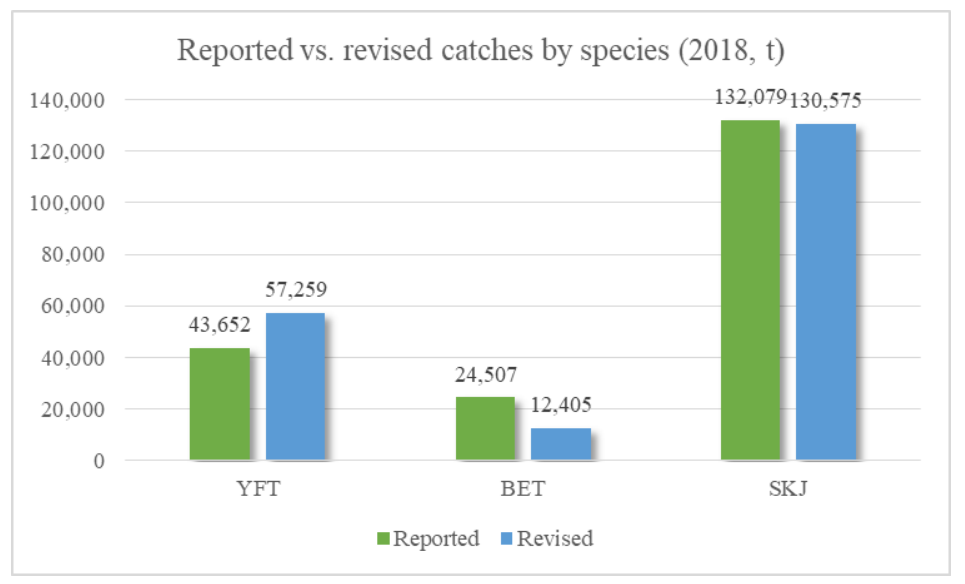Spain exceeded its lawful quota for yellowfin tuna in the Indian Ocean by 30 per cent last year, according to a re-analysis of declared catches by scientists, published today.
This amounts to over 13,000 tonnes more overfished yellowfin than it should have caught. The unlawful over-catch, worth many tens of millions of euros, exceeds the combined catch of China and Japan, is almost twice that of Korea and is substantially more than that of Taiwan.
Yellowfin tuna is sold in major retailers all over Europe. Imports of tuna from Spain to the UK increased by 30 per cent in the first half of this year, according to Eurostat data.
Spain’s over-catch was discovered after scientists from the Indian Ocean Tuna Commission (IOTC) looked at the proportion of other species – skipjack and bigeye, often caught together by purse seine fleets – and decided that 2018 was anomalous compared with previous years. Their analysis reveals a staggering over-exploitation of a stock already considered to be overfished, subject to continued overfishing and at risk of collapse.

The over-catch goes against both the requirements of international law and the EU’s own Common Fisheries Policy, and raises serious questions about the competence of the Commission in policing EU fleets in the Indian Ocean. These questions were raised at the meeting of the European Parliament Committee on Fisheries last week.
The scientists’ report is likely to further anger conservation groups concerned by a proposal to reintroduce controversial vessel construction subsides in the EU. A recent investigation by BLUE revealed that part of this Spanish fleet involved in unlawful overfishing is made up of vessels built using taxpayer-funded vessel construction subsidies issued in the early 2000s.
Charles Clover, Executive Director of the Blue Marine Foundation, said: “An EU country is contributing to the overfishing of a stock that Britain and other EU countries eat, the overfishing of which will be to the detriment of many developing countries. This shows a disgraceful failure of management by the European Commission, which has already dished out a soft penalty to Spain for over-fishing in 2017. Let us not forget, this is a time of full-scale crisis for the management of Indian Ocean tuna stocks, some of which are being overfished at levels not seen anywhere else in the world. The fishing by subsidised fleets from the developed world is having a disastrous effect upon coastal communities whose artisanal fishermen depend on tuna for work and food.”
After more than a decade since the controversial vessel construction subsidies were banned, EU fisheries ministers have endorsed a proposal to re-introduce fishing subsidies in the post-2020 European Maritime and Fisheries Fund (EMFF). Last week, the European Parliament’s Committee on Fisheries voted by 20 votes against six to reintroduce public aid for building new vessels, despite such subsidies having been banned in 2004 because of their direct role in overfishing.
Spain’s over-catch of this “near-threatened” species in 2018 follows overfishing in 2017, for which it has already been penalised by the European Commission, but on a figure less than one third of what it reported to the IOTC. The substantial discrepancies in Spain’s reported catch totals were highlighted by the South African government in a letter to the Commission earlier in the year. Despite being questioned on these discrepancies again at last week’s Fisheries Committee meeting, no satisfactory explanation was provided by the European Commission.


















